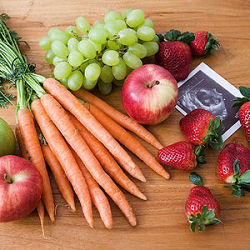 Are you a serial breakfast skipper? Been known to nosh chips for lunch? Now is the perfect time to redeem yourself.
Are you a serial breakfast skipper? Been known to nosh chips for lunch? Now is the perfect time to redeem yourself.
When you’re pregnant, whipping less-than-stellar eating habits into shape should be one of your first goals. After all, the foods and drinks you take in every day directly impact your growing baby
Below and some tips to improve your nutrition habits as your baby begins to grow.
Eating for Two
Even though you’re pregnant, you’re not quite eating for two. Most pregnant women need only 300 extra calories each day to support a baby’s growth and development. If you were underweight before pregnancy, you may need more calories. If you were overweight before pregnancy, you may need fewer. Talk to your healthcare provider about how much weight you should gain.
Healthy Meal Tips
- Fit your whole meal on one plate. Vegetables and fruits should be on half your plate.
- Eat six smaller meals each day instead of three big ones. This can help relieve heartburn and discomfort as your baby grows.
- Choose whole-grain bread and pasta, low-fat or skim milk and lean meat like chicken, fish and pork.
Hydration
- Drink six to eight 8-oz glasses of water every day. Proper hydration is very important for a healthy pregnancy. Your body needs water to carry nutrients, build new tissue, flush toxins and more.
Food Safety
- Cook foods thoroughly, especially meat, eggs and fish; use a food thermometer, especially when cooking meat.
- Pork, 145°F Ground Poultry, 165°F
- Beef/Steak, 145°F Chicken Breast, 170°F
- Ground Meat, 160°F Whole Poultry, 180°F
- Avoid unpasteurized cheese or milk.
- Refrigerate food that won’t be eaten immediately.
- Don’t eat sushi (raw fish) and avoid fish with high levels of mercury, such as shark, swordfish, king mackerel and tilefish. Limit other fish, like canned light tuna or tuna steak to 1-2 servings or 12 oz per week.
Choosing Your Prenatal Vitamin
A healthy diet may not be enough to get all the nutrients you and your baby need. Your doctor will prescribe a daily prenatal vitamin. There are many brands of prenatal vitamins; be sure to check the label to make sure you’re getting the recommended amounts of vitamins and minerals. Let your doctor know if you have a restricted (e.g. vegetarian) diet, because you may need other supplements.
Check the label for these recommended amounts:
- Folic Acid: 600 mcg
- Vitamin B6: 2 mg
- Iron: 27 mg
- Vitamin C: 85 mg
- Calcium: 1,000 mg
- Copper: 2 mg
- Omega-3/DHA: 250 mg
- Zinc: 15 mg
- Vitamin D: 600 IU
Folic Acid
Folic acid helps prevent major birth defects of the baby’s brain and spine. It can be found in lentils, chickpeas, oatmeal, fortified cereals, asparagus, spinach and broccoli, but you may not be able to consume the recommended amount of folic acid from food alone. Your prenatal vitamin should contain folic acid.
Iron
You need extra iron in your diet during pregnancy – about double the amount that a non-pregnant woman needs. This extra iron helps your body make more blood to supply oxygen to your baby. Ironrich foods include lean red meat, poultry, fish, dried beans and peas, iron-fortified cereals and prune juice. Iron also can be absorbed more easily if iron-rich foods are eaten with vitamin C-rich foods, such as citrus fruits and tomatoes.
Tip: Eat foods high in fiber to prevent constipation when taking an iron supplement if one is prescribed for you.
Calcium
Calcium helps build your baby’s bones. Calcium can be found in milk, yogurt, cheese, tofu, white beans, broccoli, spinach, collard greens, turnip greens, kale, edamame and salmon.
Omega-3/DHA
Omega-3 fatty acids are essential to your baby’s brain development. Some prenatal vitamins contain the recommended amount, but not all. Omega-3 can be found in salmon, dark green vegetables, walnuts, ground flaxseed and kidney beans.
Vitamin D
Vitamin D works with calcium to help your baby’s bones and teeth develop. It is also essential for healthy skin and eyesight. Good sources are milk fortified with vitamin D and salmon. Exposure to sunlight also converts a chemical in the skin to vitamin D.

